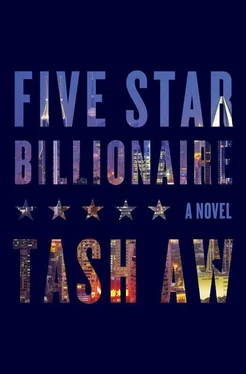She nodded, feeling his warm breath on her ear, his face pressing close to hers. She knew then that as long as he was around and happy to be at Angie’s, she would keep it going, no matter how much it cost. They stayed wrapped in their embrace, saying nothing, listening to the music filling the empty space.… Lucky that you found someone to make you feel secure … Yinghui chuckled. “You played that song on purpose, you bastard.”
“No I didn’t. It’s kind of a sad song.”
… ’cause we were all so young and foolish, now we are mature .
“You know, that thing that you mentioned, that … oil thing. You’re wrong. It’s in Kelantan, not Terengganu.”
“Same difference,” he said, leaning in to kiss her. “Somewhere up north, anyway. It’s all the same up there. Beautiful and backward.”
The following week, without telling Yinghui, C.S. paid off all of Angie’s outstanding loans, invoices, and credit notes and deposited an additional sum in the account. When she thanked him, he shrugged and said it was easy; he’d done it through one of the family companies. Well, actually, his brother, Justin, had arranged everything for him, he said, reclining in his customary position on the low gray sofa, but don’t ask how it was done, because he did not understand. It was no big deal — it was just money, after all.
She was moved not so much by the generosity of C.S.’s actions but by the solidity of his intentions; there was a permanence in the gesture, a suggestion of longevity. It was irrelevant that his family would not have even noticed a sum of money like that — because, let’s face it, her parents could have helped her out too (though perhaps not with such ease). What mattered was C.S.’s swiftness of commitment. He had done it with his customary nonchalance, but, in keeping Angie’s afloat, he meant to keep Yinghui afloat too.
It was just money, after all .
It wasn’t his fault .
It was her father’s fault, the mess he had gotten them all into .
It wasn’t her father’s fault; he was dead now .
Too many thoughts, spinning and clashing in her mind.
It was just money .
These were some of the excuses that she ran through her head, a thousand times each day, barely eighteen months later, when C.S. decided that he would stop seeing her. She tried to rationalize his decision, but the logic of it defied her. There were too many lines of reasoning that crisscrossed without ever joining up. He would not answer her calls, would not come out to see her. She passed messages through his friends — now she realized they really were his friends, not theirs — but she never heard from them. People stopped coming to Angie’s, and soon there was no one left who could act as a messenger. Even when Justin was dispatched to explain the reason behind the breakup, Yinghui could not understand it. Justin spoke with all his usual clarity — so clear as to make no sense at all. It was nothing to do with her; she had to understand this. It was just that, as a family, they had to think of the future happiness of each of their children and also that of the family. It was not an easy decision. But, well, it was getting difficult now, because of her family’s position and the sad business with her father.
“What do you mean, ‘sad business’ ?”
“I mean all the bad publicity. The whole … scandal.”
He smiled after saying this, as if the word “scandal” would make everything clear. As he left, he turned back to look at her, and she saw that he was still smiling. He smiled in the way that someone smiles when they don’t know what to say — when they don’t know what to say because they don’t feel anything, because they are thinking of more important things in their life. When he had left, she looked around her, surveying the sudden stillness of her world: the café’s chairs and tables pushed together alongside one wall, some stacked on top of one another; the vintage jukebox she and C.S. had bought on a whim, dark now, devoid of sparkle; the wires hanging from the ceiling, stripped of their designer lampshades, which she’d sold to pay the electricity bill; the empty freezer, with its door left open, a watermark at its base and a dry ring where the thawing ice had stained the polish she and C.S. had applied to the concrete floor. The only things that remained in place were the sofa on which she sat — the low gray sofa that C.S. had stretched out on, night after night, for nearly two years — and, on the walls, the signs that she had not bothered to take down. TRUE LOVE = INSULTING EACH OTHER.
She thought of the word “scandal,” letting it echo in her head for a few moments. It sounded wrong, provided no answers.
She decided that it was all about money. C.S. Lim, Justin C.K. Lim — they had plenty, would always have plenty, but she had nothing now. It was just about money.
When people heard of Angie’s closure, or when they drove past it, they would shrug as if it was no great surprise. KL was full of places like that nowadays, they would say, opened and closed in no time at all. But they would snigger and add, under their breath: She didn’t know how to do business, that girl. She was an airhead rich kid who thought her father’s money would last forever. But, ah there , you see? Some more kena dump by that Lim boy. Serve her right . If you act big, that’s what happens. She didn’t know how to do business at all, that girl; she was really stupid.
IT WAS THREE MINUTES past the appointed hour — not a good sign. Up to that point, she had assumed only good things about her host, had imagined someone with perfect manners. Walter Chao. Even the name had a stylish elegance to it, a restrained old-world quality that suggested courtesy and understated flair in a city where such things seemed to have been swept away by the relentless advance of concrete and steel, bright lights and nightlife — the kind of fast living that she herself had become accustomed to. She looked at her BlackBerry: no message. Maybe she was being stood up; maybe she should start composing a message, tell him that she had suffered a malaise, that she had been forced to go home unexpectedly: leave him in the lurch before he did it to her. But, then again, she might never know what he was going to propose; she might miss the opportunity of a lifetime. She wasn’t here on a date, for goodness’ sake, she was here to do business. But was that really worth the risk of humiliation? She was just beginning to form the opening sentence in her head— so very sorry, but I must have eaten something bad at lunchtime —when she noticed the maître d’hôtel hurrying over to the table.
“Mr. Chao is coming up in the lift now,” he said. “He is sorry to be late. He rang and left a message with me about ten minutes ago, but I was away and I didn’t see it. I’m so sorry — please will you … be understanding when you speak to him. It’s so busy tonight and I just didn’t see the message.”
Yinghui nodded and looked at her watch. 8:04 P.M. “Not a problem,” she said.
“Thank you, madame,” the maître d’hôtel said. His French accent was charmingly stereotypical; it amused her. She was going to have a good evening.
For the next minute or so she kept pretending to read the menu, but every so often she would shift her gaze subtly, taking in the people coming into the restaurant, trying to identify Walter Chao. A gaggle of smartly dressed businessmen gathered at the reception desk, handing over their camel-colored coats to the girls dressed in black trouser suits. A Middle-Eastern-looking man and his Chinese girlfriend stood waiting patiently in back of this group. Then, behind the crowd of people, she saw the maître d’hôtel holding out his hand politely but firmly in order to clear a space. Yinghui caught a glimpse of a light-gray jacket and sky-blue shirt. The maître d’hôtel hurried toward her like a one-man police cavalcade; she looked down at her menu, turning the page as if she were deep in concentration. When she looked up, she saw him inclining his head in a half bow; next to him was Walter Chao. She stood up and offered him her hand, which he grasped firmly without squeezing, while looking her in the eye.
Читать дальше
Конец ознакомительного отрывка
Купить книгу


![Scott O’Hara - Five-Star Fugitive [= Border Town Girl]](/books/432138/scott-o-hara-five-thumb.webp)









